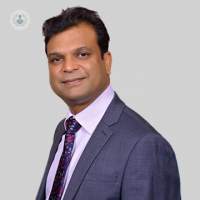Are heart murmurs dangerous?
Written by:In our latest article below, Dr Neeraj Jain, an esteemed consultant paediatric cardiologist, details what heart murmurs are, and whether or not they are a cause for concern in children.

What is a heart murmur? Is it dangerous?
A heart murmur is an extra heart sound that a doctor can hear in your child’s heartbeat when using a stethoscope. A heart murmur is an extra swishing sound in one’s heartbeat. Normal heart sounds are produced whenever the heart valves open and close. Heart murmurs could be produced as a result of some turbulence in the heart flow.
Heart murmurs, per se, are not dangerous. However, having said that, if this heart murmur is occurring due to any significant cardiac defect, then the underlying cause should be explored further and treated accordingly.
What can cause a heart murmur in children?
Heart murmurs are caused by turbulence in blood flow. Any hole in the heart, any heart muscle disease, or narrowing of the heart valves, can lead to the development of heart murmurs. When the blood flow is too fast for one’s heart, the swishing sound (heart murmur) can also be caused.
Are heart murmurs genetic?
Heart murmurs are not genetic. However, if a child has a heart murmur, there is a high chance of siblings having some heart abnormalities that may lead to heart murmurs.
What are the main symptoms associated with heart murmurs?
Most heart murmurs are asymptomatic. However, if the heart murmur is accompanied by or caused by any significant heart abnormalities such as a hole in the heart, symptoms can occur. They can be varied, and typically include the following:
- feeding problems
- inadequate weight gain
- excessive sweating
- blueish discoloration of their skin
- palpitations
- breathlessness
How is a heart murmur diagnosed?
The first assessment will be carried out through a stethoscope. The gold-standard test for diagnosing heart murmurs is an echocardiogram. Sometimes, we need to carry out an electrocardiogram, chest X-rays, and/or CT and MRI scans of the chest.
Do heart murmurs always need to be treated? If so, how?
Most heart murmurs do not require treatment. However, if there is a cardiac defect, monitoring is required. Valve repair surgery may be necessary for patients with valve defects. Open-heart surgery may be required in severe cases.
If my child has a heart murmur, can they still play sport?
Children with heart murmurs can live an ordinary life and can engage in physical activity. The heart murmur will not affect them when carrying out their normal activities. However, heart murmurs should always be monitored by regular check-ups with the doctor.
To book an appointment with Dr Neeraj Jain, simply visit his Top Doctors profile today.


